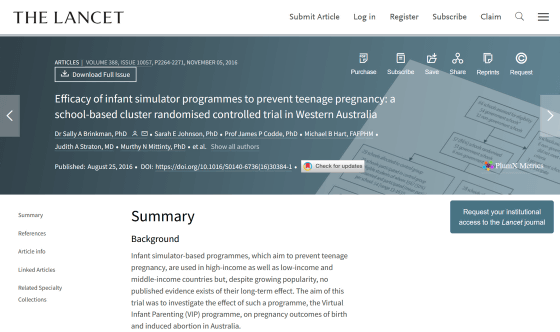A case where a 'childcare simulation program' was introduced to prevent teenage pregnancy, but it actually resulted in an increase in teenage pregnancy.

In some countries and regions, 'baby simulation programs' that simulate the experience of raising a baby are offered as part of sex education programs to prevent teenage pregnancy and childbirth. However, a 2016 paper reported that these programs actually increased the number of teenage pregnancies.
Efficacy of infant simulator programs to prevent teenage pregnancy: a school-based cluster randomized controlled trial in Western Australia - The Lancet

Electronic baby simulators could increase, not decrease, teen pregnancy
https://theconversation.com/electronic-baby-simulators-could-increase-not-decrease-teen-pregnancy-64431
Baby simulators not effective in preventing pregnancies, study says | CNN
https://edition.cnn.com/2016/08/30/health/baby-simulator-teenage-pregnancy/index.html
Australian researchers conducted a study of 13- to 15-year-old girls from 57 schools in Western Australia, assigning them to either a baby simulation program or a standard pregnancy prevention curriculum. They followed them until they were 20 years old. The program was conducted between 2003 and 2006, and of the 2,834 girls who participated, 1,267 participated in the baby simulation program, while the remaining 1,567 participated in the standard school curriculum.
The baby simulation program included educational workbooks and documentary viewing, as well as a simulated baby care experience using a 'baby robot' on weekends. Participants had to perform tasks such as feeding, burping, putting the baby to sleep, and changing its diaper.
The goal of the baby simulation program was to help girls understand the challenges of raising a child and discourage unwanted pregnancies. The workbook also included sessions on the financial costs and health issues of having a baby, and a documentary focused on teenage mothers.

However, after tracking the subjects' medical records for six years until they turned 20, it was found that about 11% of girls who participated in the standard pregnancy prevention program became pregnant, while about 17% of girls who participated in the baby simulation program became pregnant. It turns out that the baby simulation program, rather than preventing teenage pregnancy, actually increases the rate of pregnancy.
Additionally, more than 60% of girls in the standard pregnancy prevention program chose to have an abortion, while the abortion rate for girls in the baby simulation program was less than 50%. Overall, approximately 8% of girls in the baby simulation program had a baby as a teenager, making them twice as likely to become a teenage mother compared with 4% in the control group.
Even after reanalyzing the data, taking into account factors such as the girls' socioeconomic status, family structure, sexual experience before the program, previous experience of caring for a baby, levels of psychological distress, tobacco and alcohol habits, and education level, clear differences still emerged between the two groups.
'This is definitely more than just a trend. Clearly, the programs aren't working,' said lead author Dr. Sally Brinkman, a researcher at

Although the study did not involve questionnaires or other methods of administering the medication to the pregnant subjects, Brinkman speculates that the support and positive feedback from their families in the baby simulation program may have given the girls confidence that they could raise a baby on their own.
Heather Rowe, a researcher at
Dr. Julie Quinlivan of the University of Notre Dame Australia , one of the reviewers of the paper, told CNN that the underlying causes of teenage pregnancy are social, psychological, and educational disadvantages. 'Future research should consider strategies to promote improved educational opportunities for vulnerable girls as a way to reduce teenage pregnancy. The more educational opportunities we provide vulnerable women, the more likely they are to gain employment and improve healthcare for themselves and their children, and the less likely they are to see early parenthood as a 'career path.''

Related Posts:







